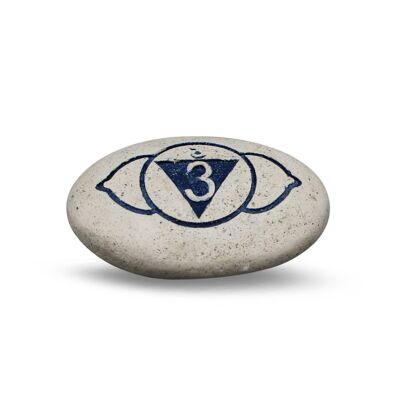


The Sixth Chakra, represented with two petals and the third eye of Shiva. The seed syllable in the middle is Om. Ajna is Sanskrit for knowing and is the sixth chakra according to Hindu and yogic traditions, within which chakras contain physical, emotional and spiritual components. The Ajna Chakra is also called the Third Eye and Shiva's Eye. Ajna is located in the center of the forehead, just above the point between the eyebrows and represents mindfulness and awareness. Spiritual meaning: Physical: The forehead chakra is said to influence the functioning of all endocrine glands, which is essential for health from that philosophy. Disturbances may manifest themselves on a mental level, such as anxiety, a sense of meaninglessness and aimlessness, or problems concentrating. If this chakra is almost completely empty, it would lead to serious mental illness or depression, while an overactive chakra stands for delusions and schizophrenia. Emotional: If the life energy gathers in the sixth chakra and blockages are removed, it would be possible to reach a higher consciousness. An important symbol for the sixth chakra is Shakti Hakini, an androgynous deity, representing both the male and female aspects, thus transcending duality. The Ajna chakra represents the care of the connection with the spiritual world and the opening of the gates to intuitive knowledge. It refers to a reality that emerges once the dualistic perception of the world is transcended and the thoughts come to rest. Symbolic: Ajna is associated with the following symbols: Gods: Ardhanarishvara, Hakini and Shakti Element: light Body parts: cerebellum, face, eyes, nervous system Planet: Uranus Alternative names: Tantras: Ajita-Patra, Ajna, Ajna-Pura, Ajna-Puri, Ajnamhuja, Ajnapankaja, Bhru-Madhya, Bhru-Madhya-Chakra, Bhru-Madhyaga-Padma, Bhru-Mandala, Bhru-Mula, Bhru-Saroruha, Dwidala, Dwidala-Kamala, Dwidalambuja, Dwipatra, Jnana-Padma, Netra-Padma, Netra-Patra, Shiva-Padma, Triweni-Kamala Vedas (later Upanishads): Ajna, Baindawa-Sthana, Bhru Chakra, Bhruyugamadhyabila, Dwidala Puranas: Ajna, Dwidala, Trirasna

















